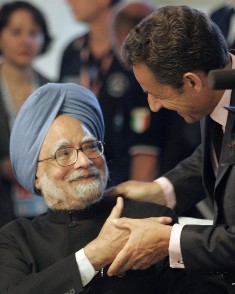Indian armed forces take part in French National Day, but defence ties moving at a snail''s pace
 Paris, July 14 : While 400 soldiers marched briskly down the Champs-Elysees in front of French President Nicolas Sarkozy and Prime Minister Dr. Manmohan Singh on Tuesday, defense deals between the two countries, will in all probability, move inversely proportional in speed.
Paris, July 14 : While 400 soldiers marched briskly down the Champs-Elysees in front of French President Nicolas Sarkozy and Prime Minister Dr. Manmohan Singh on Tuesday, defense deals between the two countries, will in all probability, move inversely proportional in speed.
In the working lunch between President Sarkozy and Prime Minister Singh, the slow pace of defense deals is sure to come up, but officials were tight lipped about details regarding the meeting.
All they would reveal was that regional issues like AF-PAK, terrorism and yes defense cooperation could come up at the talks.
New Delhi is interested in modernising its 51 Mirage 200H which is approximately a billion Euro deal, and quite naturally, the French would want it signed sealed and delivered as soon as possible. But, India moves slowly in defense deals.
Defence Secretary Vijay Singh, who is a part of the Prime Minister''s delegation, said before the Prime Minister''s meeting with the French President, that negotiations were proceeding at a pace that was expected in such huge deals.
Both New Delhi and Paris are keen to push defense cooperation to higher levels. Indo-French defense cooperation can move forward if France is able to grab the huge defence deal for 126 multi-role combat aircraft.
France is eager to sell its multi-role Rafale fighters to India. This aircraft presently serves the French Air Force and Navy and its technology is in sync with the Mirage-2000-V jets, which was the original choice of the Indian Air Force. These aircraft, however, don''t come cheap. The US made F-16s and the Russian MiG-29M2 are equivalent in prowess and are competitive in pricing.
Indo-French defence cooperation agreements in the past have been in areas of research and development, production of weapon systems, joint military exercises, counter-mechanisms to thwart international terrorism and the sharing of military technology and hardware expertise.
Cooperation between French and Indian defense firms was evident in the development of the engine of the Shakti helicopter involving Turbomeca and Hindustan Aeronautics Limited.
The Indian Navy keeps its channels open with the six Scorpene submarines built in Mumbai by Mazagon Docks and DCNS, which transferred all technologies and know how to build it. India and France have continually strengthened their bilateral naval relations, and have recently conducted the annual bilateral exercise called "VARUNA".
The Joint Declaration of 2008, which explicitly mentions the wish of both countries to increase cooperation in the field of defence, is the directional force for these forward movements.
India and France share a discreet but efficient collaboration through the Strategic Dialogue, which was first, inked in 1998, and has been upgraded at regular intervals to allow for a regular exchange of concrete information on terrorism.
President Sarkozy’s first visit to India between January 25 and 27, 2008, provided a fresh impetus to the strategic partnership between the two countries.
That visit reinforced the interests of both countries in maintaining close and friendly ties and in strengthening a multi-polar world order.
The two countries signed several major agreements related to defence, nuclear research, space and healthcare. There was also a convergence of ideas on international issues. A Joint Statement and a Joint Declaration on global warming was also signed.
Presently, Indo-French co-operation lies on three pillars – defence, academic exchanges and co-operation in science and technology. Leaderships of both countries have acknowledged that much more needs to be done to raise the level of bilateral trade. They have set a target of achieving 12 billion euros worth of bilateral trade by 2012.
During his visit, Sarkozy articulated the point that both countries are fast growing market-oriented economies, and therefore, there was a need to make greater efforts to penetrate each other''s market.
He promised that French companies would invest 10 billion euros by 2012 and that he would take steps to ease conditions for the entry of Indian businesses into the French market to engage in more joint collaborative projects in sectors like healthcare/pharmaceuticals, encourage joint research and development in information and technology, telecommunications, automobile sector, consumer goods and high technology including nano and bio-technology sectors.
In the energy sector, France has said that it is ready to co-operate with India in the civilian nuclear domain. France and India together, have agreed to promote nuclear energy with the highest standards of safety and security in accordance with their respective nuclear policies and international obligations.
France has played a significant role in ensuring a Nuclear Suppliers Group (NSG) guidelines waiver for India and has been a strong supporter of the Indo-US nuclear deal.
Joint development in agriculture is another significant feature of the evolving relationship between the two countries. India and France are also expanding the scope to venture further into the roads and railways sector.
Military ties between India and France are developing steadily and today it includes joint research and development, production, marketing, regular co-operation between the different branches of arms and joint training exercises.
On issues relating to extremism and terrorism, both countries have decided to address the threat bilaterally and globally. Steps are being taken to strengthen the India-France Joint Working Group on Counter-Terrorism to face this common threat. (ANI)